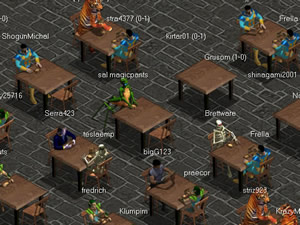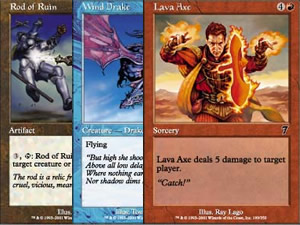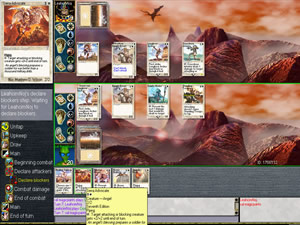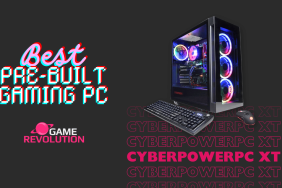I Lightning Bolt your Order Of Leitbur…
I admit it. I played Magic: The Gathering for years. My brother showed
it to me when it was fairly new. I bought some starter packs and some Antiquities
boosters and got quickly hooked. It was great fun back then, and there was no
other game like it.
For the seven of you reading this review that aren’t familiar with it, Magic
is a collectable trading card game. In fact, it was the first big one, although
there are probably hundreds now. Magic, and its baby brother Pokemon,
are the games that helped turn the small, successful company Wizards of the
Coast into a billion-dollar juggernaut.
The
game works like this: you buy packs of random cards, separate the ones that
you want, and put them together in a deck. These cards represent monsters, land,
warriors, magic items, and magic spells. They all have individual names, properties,
and art, like the Bog Imp, the Serra Angel, the Fireball or the Black Vise.
Some of the more rare and powerful cards are worth
a fair bit of money.
The idea is that you and your opponent are dueling wizards. You play with your
deck, and he plays with his. You use your lands to draw magical power called
mana, then you use the mana to summon monsters and cast spells to kill your
opponent.
The rules are actually very, very complex, and as the game grew and more and more new cards were created, rules were changed (or “clarified”) and the game just got ridiculous. What was once a friendly and fun game had turned into endless arguments about “spell stacks” and “damage resolution.” So I pretty much stopped playing.
(These are just my opinions here, folks. So MTG fans, please, no hatemail.)
So now we come to Magic: The Gathering Online, which is exactly the
same as the card game, right down to buying the cards. Here’s how it works:
the software is free (click
here to download it), but you have to buy packs of virtual cards in order
to play. The cost is the same as real-life magic cards: 60 card packs for $9.99,
40 card packs for $7.99 and 15 card booster packs for $3.29. When you buy some,
the information about your cards is stored on the Wizards of the Coast
server to try to prevent hacking and cheating. You can even trade your virtual
cards with other players.
However, getting started, setting up an account and buying your first cards
is almost as complicated as the game itself and took me the better part of an
hour. The boxed retail version of the game costs about $15, but comes with a
$9.99 credit towards setting up your account. And the account is $9.99, but
comes with a $9.99 gift certificate towards your card purchase.
The problem is that instead of integrating the purchase of cards and accounts
into the game, it goes through the Wizards of the Coast online store,
where you can buy all kinds of stuff… awkwardly. If you already have an account
at the Wizards store, it won’t let you create a new one using the same
e-mail address, so your online player’s name is locked as whatever your account
name already is. Then it’s a simple process of filling out form after form filled
with dozens of questions about your opinions and experience with trading card
games. Eventually you can enter your shipping and billing information,
even though they’re not shipping you anything and you supposedly have
a code to make your first purchase free.
The shopping cart they use never tells you how much it is going to charge
you until after it charges you, which makes me nervous at best. So just
cross your fingers and click the button, and if you entered the code right on
the back of the CD case, you will get two e-mails. The first has the password
for your account, the second has the code for your gift certificate.
So then it’s back to the store, log in with your new password, enter your new gift certificate code, and at long last buy some cards. Of course, you’ll need a credit card too, because even though you have a $9.99 gift certificate for a $9.99 deck of cards, the government wants their share.
Honestly, I’m not sure that the government should be able to tax imaginary
products. Can I pay with imaginary money? I have plenty of extra gold in Ultima
Online.
 So
So
1 hour, 2 emails, 3 passwords, 17 forms, and 85 cents on my Visa card later
and I’m ready to play!
The game, at least, works smoothly. If you bought a pre-constructed deck like I did, you’re ready to go. I recommend this option for any beginner. Experts can buy all the cards they want and reorganize them into killer custom decks using a well designed interface.
The graphics are fine and functional, nothing fancy. The digital cards look
good, just like their real world counterparts, complete with very nicely translated
art. For aficionados, you can currently get cards from the Seventh Edition,
Invasion, Planeshift, Apocalypse, Odyssey, Torment, and Judgement card sets.
Finding an opponent is easy. Just choose any of the available rooms: Training Room, Casual Play, Leagues, Clans, etc. In the room, you’ll see lots of people (or aliens, or magical beings) sitting at tables. Either start your own game or just pick an empty chair across from someone to start playing.
The online game is exactly the same as the card game. Exactly. The interface
is totally intuitive to any current MTG player – just click on your cards
and move them around. The computer smoothes out a lot of the gameplay quirks
by skipping unnecessary phases (and, more importantly, removing all rule arguments).
But when the battles get thick, you will find yourself going through dozens
of phases for just a single round of combat. Both you and your opponent have
to click on the “ok” button to end each phase, and sometimes you’ll miss an
important move because you accidentally clicked the “ok” button one too many
times.
But other than that, I don’t really have any criticism for the online game itself other than the same ones I have for the card game, because they are identical.
Magic: The Gathering Online is simply another way to play the original
MTG. I can’t really recommend it for new players because I can’t imagine
learning to play this complex game without someone there to help you out. But
for current Magic junkies who can’t play as often as they would like, or can’t
find anyone in their local area to give them a challenge, the online version
would be ideal.
It only costs you ten bucks (and some time) to get started and gives you all the bang of the real game. If you like it, you can buy 5 decks and still have only spent the same amount as a regular PC game.
I’m quite impressed that they managed to make a computer version that actually
follows all the arcane rules. Still, I can’t see myself buying any more cards
beyond the ones I already have. I just feel weird about spending real cash for
imaginary stuff. Review phase ended.

-
All the great stuff from the card game
-
Good interface
-
Nice graphics
-
All the lame stuff from the card game
-
A big pain to get started
-
Not for new players







